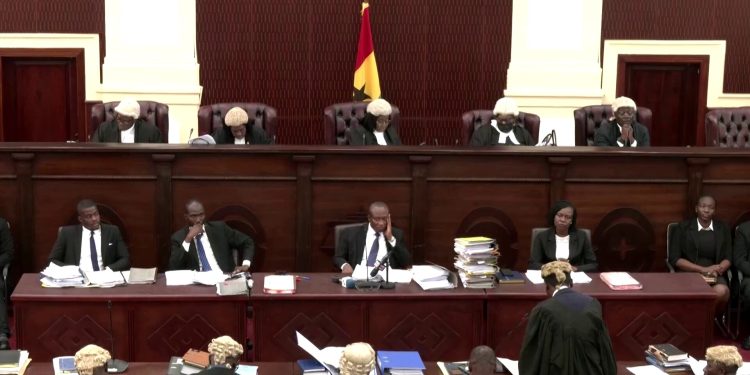The Supreme Court has set Tuesday, November 12, to deliver its judgment on Speaker of Parliament Alban Bagbin’s decision to declare four parliamentary seats vacant.
At the previous hearing, the Attorney-General raised concerns about the legality of the Speaker’s continued representation by Thaddeus Sory, arguing that there was no approval from the Public Procurement Authority.

During today’s proceedings, Thaddeus Sory, the Speaker’s counsel, was absent as the court prepared to issue its ruling on this contentious decision.
Chief Justice Gertrude Torkonoo, after hearing from the Attorney General, stated, “By court, the judgment of this court will be delivered tomorrow, November 12, 2024.”
Case Background
The central issue in this case revolves around Speaker Bagbin’s decision to declare four parliamentary seats vacant, a move based on his interpretation of Article 97(1)(g) of the Ghanaian Constitution. This action has sparked significant legal and political debate.
Majority Leader Afenyo-Markin has contended that Bagbin exceeded his constitutional powers by vacating the seats without judicial review or the option for by-elections.
In response, the Supreme Court issued an interim injunction halting the implementation of the Speaker’s decision while the case is pending.
In an effort to reverse the Court’s injunction, Speaker Bagbin argued that the Supreme Court lacked the jurisdiction to rule on parliamentary decisions, asserting that such matters are non-judicial.
Thaddeus Sory further argued that judicial interference in parliamentary affairs would undermine the separation of powers outlined in the Constitution.
Court’s Ruling
Chief Justice Gertrude Torkonoo delivered a ruling rejecting Bagbin’s application, affirming the Court’s authority to intervene when parliamentary actions appear to violate constitutional provisions.
She emphasized the potential disenfranchisement of constituents who could lose their representation without the possibility of by-elections, particularly with the December 7 general elections approaching.
The Chief Justice ordered both parties to submit their statements of claim within seven days, aiming for a swift resolution of the core issues.
Implications for Parliamentary Authority
As the Supreme Court prepares for its ruling on November 12, the legal challenge over the Speaker’s choice of counsel remains unresolved.
The Attorney-General’s objections highlight the complex relationship between parliamentary authority and judicial oversight, raising crucial questions about the limits of power within Ghana’s government structure.
This case underscores broader concerns about the separation of powers, the scope of parliamentary authority, and the judiciary’s role in safeguarding constitutional integrity.
























































![[FREE FREE MONEY] Predict and Win a Guaranteed GH¢200 From Us EVERY WEEK](https://wordpress.ghanatalksradio.com/wp-content/uploads/2022/02/Predict-and-Win-Final-09-03-2021-218x150.jpg)
![[Predict & Win – 8th/Oct.] WIN A Guaranteed ¢200 From Us This Week](https://wordpress.ghanatalksradio.com/wp-content/uploads/2021/10/maxresdefault-16-218x150.jpg)
![[Predict & Win – 2nd] WIN A Guaranteed ¢200 From Us This Week](https://wordpress.ghanatalksradio.com/wp-content/uploads/2021/09/maxresdefault-50-218x150.jpg)
![[Predict & Win – 25th] WIN A Guaranteed ¢200 From Us This Week](https://wordpress.ghanatalksradio.com/wp-content/uploads/2021/09/maxresdefault-36-218x150.jpg)
![[Predict & Win – 18th] WIN A Guaranteed ¢200 From Us This Week](https://wordpress.ghanatalksradio.com/wp-content/uploads/2021/09/maxresdefault-23-218x150.jpg)







![[National cathedral] See full list of churches that have contributed since 2018](https://wordpress.ghanatalksradio.com/wp-content/uploads/2020/09/Ghana-National-Cathedral-GhanaTalksRadio-100x70.jpg)



